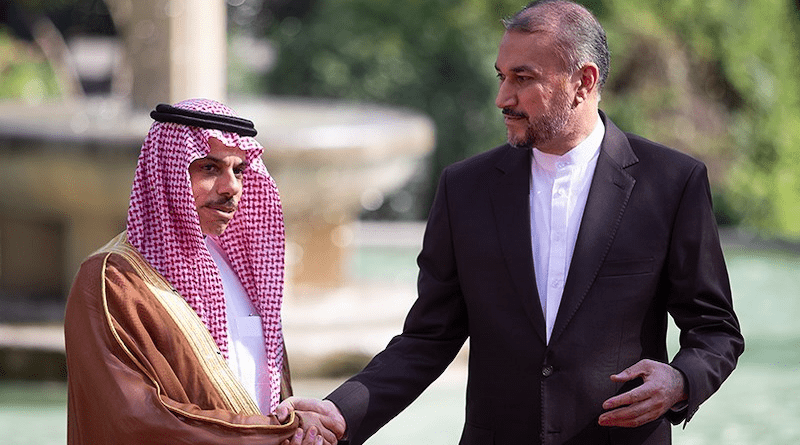A New Dawn For Iran-Saudi Arabia Relations – OpEd
The Middle East’s geopolitical landscape has long been defined by the complex and often contentious relationship between Iran and Saudi Arabia. These two regional powerhouses have historically found themselves on opposing sides of different conflicts, striving for influence and establishing their supremacy.
Recent events, however, have indicated a potential shift in the dynamics between the two countries, which might affect not just their bilateral relations but also the future of Iran’s nuclear programme.The relationship between Iran and Saudi Arabia has thawed noticeably in recent years. Both countries have shown a readiness to communicate and have made significant gains in de-escalation. This change is the result of a convergence of interests and an understanding of the necessity of maintaining regional stability.
First and foremost, both countries have sought paths for reconciliation after realising that continued hostility between Iran and Saudi Arabia only helps to widen sectarian differences. Iran and Saudi Arabia have supported opposite sides in the tragic conflicts in Syria and Yemen, which have caused tremendous misery and destruction. It is becoming more and more clear that these proxy wars foster extremism and pose a serious threat to the stability of entire region.
Moreover, both Iran and Saudi Arabia’s calculations have been impacted by the shifting geopolitical landscape. The Middle East’s regional powers have revised their positions in response to the United States’ transition to a more restricted foreign policy strategy. Saudi Arabia has been encouraged to look at possibilities for rapprochement with Iran by the Biden administration’s efforts to re-engage with Iran through the resurrection of the Joint Comprehensive Plan of Action (JCPOA) nuclear accord.
Saudi Arabia is aware that it is no longer possible or wise to isolate Iran. The dynamics between Iran and Saudi Arabia may be changing, and this might have a significant impact on Iran’s nuclear programme. Iran has shown its desire to abide by the parameters of the JCPOA and engage in constructive discussion by resuming talks with the international community about it.
As a result, economic sanctions may be loosened, enabling Iran to resurrect its economy and reclaim its status as a regional powerhouse. Iran’s status on the world arena could be further strengthened by the anticipated normalisation of relations with Saudi Arabia. The readmission of Iran into the international community may make it possible for more cooperation on nuclear concerns as the balance of power in the area changes. Saudi Arabia, which acknowledges Iran’s legitimate right to a peaceful nuclear programme, can be a helpful partner in ensuring that the programme remains open and in accordance with global standards and safeguards.
Additionally, a more cooperative approach between Iran and Saudi Arabia would help to stabilise the area. The danger of a destructive military conflict that could thwart the advancements achieved in settling the nuclear issue would decrease with the de-escalation of hostilities. While there is still a long way to go before Iran and Saudi Arabia’s relations are better, recent events give reason for optimism about a new age of collaboration and stability in the Middle East.
Both Iran’s nuclear programme and the larger regional security system may be significantly impacted by the eventual normalisation of relations between these two regional superpowers. Iran and Saudi Arabia have the chance to create a more prosperous and secure future for their people as well as the region as a whole by grabbing this chance for dialogue and reconciliation. For the interest of all parties involved, it is crucial for both nations to give diplomacy top priority and to keep building on the recent encouraging achievements.

